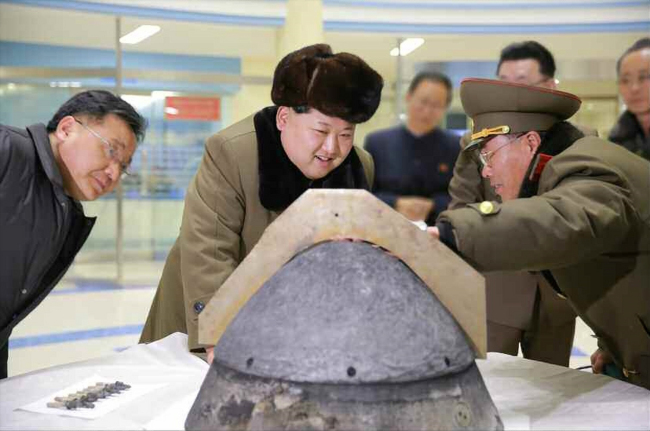South Korea’s Defense Ministry on Tuesday cast doubts on North Korea’s ability to ensure that its intercontinental ballistic missiles can reenter the atmosphere after being fired, despite its claims to have acquired the related technology.
The ministry’s spokesman Moon Sang-kyun said that based on intelligence reports, Pyongyang does not appear to have acquired the technology to develop a “reentry vehicle” for its long-range missiles, which is key technology required to utilize the weapons.
“What the North announced today is a unilateral claim. … The RV technology conventionally depends on the compound of the ballistic missile, corrosion (of the missile upon reentry) and terminal phase homing technology, which can all be confirmed through a test launch,” he said. The North has yet to conduct a test launch of its ICBM KN-08 missile.
Earlier in the day, North Korean leader Kim Jong-un said that his troops will test-fire a ballistic missile that can be armed with a nuclear warhead “in the near future.” He also vowed that there will be a nuclear warhead detonation test.
 |
| North Korean leader Kim Jong-un (middle) looks at a device presumed to be a warhead of a ballistic rocket in this photo released by North Korea’s Rodong newspaper on Tuesday. (Yonhap) |
The North’s state-run Korea Central News Agency reported that Kim had attended an atmospheric reentry simulation of a ballistic missile. It claimed that the test affirmed that the ballistic rockets are able to withstand five times the heat and pressure expected to occur upon reentry.
Kim had claimed that his country now has the capacity to miniaturize a nuclear warhead to be mounted onto a ballistic missile. The Defense Ministry has also denied this.
Pyongyang has been stepping up threats since the U.N. passed earlier in the month the strongest set of sanctions against it in decades, as punitive action against its Jan. 6 nuclear testing and Feb. 7 long-range missile launch.
South Korea’s Defense Ministry told the National Assembly early Tuesday that the North is currently conducting military drills aimed at destroying key facilities in the capital. The hermit kingdom on Saturday had warned that it will conduct what it called a “Seoul liberation plan” as a preemptive attack against the South.
North Korea has vowed an “all-out” attack in response to the annual Seoul-Washington joint military drills.
The ministry also said that the military is on alert for further provocations from the North, which may involve the North sending drones, causing skirmishes along the border, firing missiles, GPS jamming or carrying out terrorist activities.
Local experts have said that the North may carry out an ICBM testing in the near future, although it is unlikely the test-launch will actually carry a nuclear warhead. A multiple-staged demonstration of a nuclear warhead detonation and an ICBM launch is possible, they added.
Cheong Seong-chang, a senior research fellow at the local think tank at Sejong Institute, said there is high probability of the North pushing ahead with a long-range rocket test and a nuclear testing to add credibility to its claims. He speculated that it may occur before the convention of the North’s ruling Workers’ Party in May.
U.K.-based institute IHS Jane’s had said that the North’s actions may stave off mounting pressure from the surrounding countries. In light of rising inter-Korea tensions, the U.S. has deployed its high-powered strategic assets in the peninsula including a nuclear-powered supercarrier John C. Stennis.
By Yoon Min-sik
(minsikyoon@heraldcorp.com)

